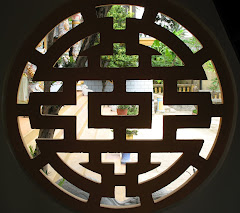The room was entirely green.
Dark green curtains covered every wall, and the space that peeked between was a lighter shade of green plaster. The small couches that all 9 of us squeezed ourselves into were green. The men who stood before us, as we rose and stood close together to shake hands individually with each official there, were dressed in brown and green camoflauge, or solid green uniforms with prestigious adornments.
We were at the 37 Military Hospital. Guides took us on a tour around the place after we nodded our heads to each important name there. We were impressed by the emmaculate cleanliness and the very new, modern feeling of the hospital, completely different to the rugged rural hospital and research center we had stayed in at Navrongo.
We got to meet with the head of the information database there. I felt bad for him, because we entered his office and, since there were not nearly enough chairs, stood in a confronting half circle around him, notepads balanced on our forearms, firing questions like flashes of light in an interrogation setting, each one coming before he had even finished answering the last. Most of us were unaware of our overwhelming presence, but Katie, Liz and I noticed and had to stand back and sort of laugh. The Defense Dept. is not quite adept at informal, comfortable interviews. I can't blame them, their minds were on each question they wanted to ask, and we were getting a lot of good information, which was exciting to them.
We ate lunch back at the Kofi Annan, and then Beachley, Brooke, Liz, Katie and I went to the Ashesi University to meet with "participants," which were mostly students, two international ones from American University, and two professors. The room we were in was long and fairly thin, with tiny desks gathered too close together, and reaching end to end of the three walls, with a little bit of space between them and the white board on the fourth wall. The students were already there, and had been waiting for about a half hour for us (Ghana time was generous).
We handed out consent forms, and then a survey called the Lickert Survey, which assesses cultural and demographic characteristics (originally in order to conduct better business interactions,) but more importantly, we were there to receive feedback on the students' thoughts about organized aid systems and Ghana's role in the process.
When Brooke had collected the surveys, Beach got to the front of the class and spoke eloquently and articulately, communicating exactly what we were doing and what we wanted to hear from them. He used the white board behind him for efficient diagrams of the way aid systems work, and possible hitches that come up in the flow of money and information. He opened to the students at the end with a well-timed, "Your turn." Beach is clearly a Communications professor, and an efficient one.
They began slowly. They talked about people at the top of the chain neglecting to listen to those at the bottom, who know exactly what is needed. They talked about trust, the lack of it on both ends of the spectrum, and the resulting problems. One guy talked about money being given to "this white man" to do something, and "this white man" to do something else, so that the money is only a fraction of what it was when it reaches those who need it.
One of the American girls was very confronting about what exactly we were going to do with all of this information, and whether or not the "data" we were collecting would be put on a shelf and begin to collect dust. Brooke answered that our results would be delivered to the four-star level, the highest it can go.
Towards the end, the students talked a lot about their most pressing concern, the importance of Ghana being a self-sufficient country, able to stand on its own feet and deal with its own problems without dependence on foreign/international aid. Beach did a great job mediating, getting the participants to really think and take the conversation very far.
It abruptly ended, however, due to a lack of time. But everyone was so enthused afterwards that many stayed behind to talk with us about their continued thoughts on the whole matter.
One student who had been about to speak up gave his ideas to Liz, Katie and I as we listened. He talked about the importance of educating the young generation, and how the education systems in Ghana are focused on success only, and leave no room for creativity and originality. They do not breed people who could be capable of an original or unique idea, and that, he said, was what would make Ghana really successful. He cited Japan as an example, how the Japanese "got their act together" after WWII, without Western help, and became one of the most powerful and successful countries.
Lena and Brooke talked with the students as well, about exchange programs with Ashesi and VWC, and about their majors, and ideas for the future. It was very inspiring and reassuring that these young students were the upcoming generation for Ghana, because it gives us all hope to see such bright and talented people who care about their country. It is something I do not see enough in America. Had we talked about the same problems in a class back home, not many students would speak up (just look at a typical philosophy class). A student back home would not know anything about Ghana, either, whereas the students here knew everything about American politics and culture. It impressed us all, and gave us a better understanding of how stable the country is and will be in the future.
~Lauren
Saturday, January 19, 2008
Subscribe to:
Post Comments (Atom)

.jpg)
.jpg)
No comments:
Post a Comment